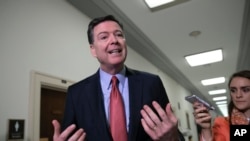ອະດີດຫົວໜ້າຫ້ອງການສັນຕິບານກາງ (FBI) ທ່ານເຈມສ໌ ໂຄມີ “ໄດ້ລະເມີດ” ຂໍ້ຕົກ
ລົງການເຮັດວຽກຂອງທ່ານ ໂດຍເຮັດໃຫ້ບົດບັນທຶກທີ່ບໍ່ເປັນຄວາມລັບ ກ່ຽວກັບການ
ໂອ້ລົມຂອງທ່ານກັບ ປະທານາທິບໍດີດໍໂນລ ທຣໍາຮົ່ວໄຫຼໄປໃຫ້ ສືມວນຊົນ, ອີງຕາມ
ການສະຫລຸບຫ້ອງການສັງເກດການກະຊວງຍຸຕິທຳ ທີ່ຂຽນ ຢູ່ໃນລາຍງານທີ່ໄດ້ລໍ
ຖ້າມາດົນນານແລ້ວ ແລະນຳອອກມາເຜີຍແຜ່ໃນວັນພະຫັດວານນີ້. ການຮົ່ວໄຫຼໄດ້
ແຜ່ເຜີຍຢ່າງກວ້າງຂວາງ ຈຶ່ງເຮັດໃຫ້ມີການແຕ່ງຕັ້ງໄອຍະການພິເສດ ທ່ານໂຣເບີດ
ມັນເລີໃນເວລາ ບໍ່ນານຫຼັງຈາກທ່ານໂຄມີໄດ້ຖືກປົດຈາກໜ້າທີ່ໃນເດືອນພຶດສະພາ
ປີ 2017.
ເຖິງແມ່ນວ່າທຳນຽບຂາວໄດ້ຕຳໜິ ທ່ານໂຄມີຢ່າງແຮງວ່າເຮັດ “ໃຫ້ເປັນໂຕຢ່າງທີ່ອັນ
ຕະລາຍ” ໂດຍການເປີດເຜີຍບົດບັນທຶກດັ່ງກ່າວ ກໍຕາມ ແຕ່ວ່າ ຫົວໜ້າຫ້ອງການ
ກວດສອບໃຫຍ່, ທ່ານໄມເກີລ ໂຮໂຣວິທສ໌ ໄດ້ຂຽນຢູ່ໃນລາຍງານ 83 ໜ້າວ່າ ບັນດາ
ຜູ້ສືບສວນບໍ່ໄດ້ພົບເຫັນວ່າ “ມີຫລັກຖານໃດ” ທີ່ທ່ານໂຄມີ ຫຼືທະນາຍຄວາມຂອງທ່ານ
ໄດ້ເປີດເຜີຍຂໍ້ມູນທີ່ເປັນຄວາມລັບໃດໆ. ກະຊວງຍຸຕິທຳໄດ້ປະຕິເສດທີ່ຈະນຳເອົາ
ການກ່າວຫາວ່າມີຄວາມຜິດທາງອາຍາ ຕໍ່ທ່ານໂຄມີ ແຕ່ຢ່າງໃດ.
ລາຍງານກ່າວວ່າ “ອະດີດຫົວໜ້າຫ້ອງການ, ທ່ານໂຄມີ ໄດ້ເຮັດຕາມໜ້າທີ່ຮັບຜິດ
ຊອບດ້ານີ້ນີ້ ໂດຍທີ່ບໍ່ໄດ້ເປີດເຜີຍຂໍ້ມູນທີ່ສຳຄັນ. ໂດຍການທີ່ບໍ່ໄດ້ຮັກສາຂໍ້ມູນທີ່
ສຳຄັນທີ່ໄດ້ມາຢູ່ໃນໄລຍະການປະຕິບັດງານຂອງທ່ານຢູ່ໃນຫ້ອງການ FBI ແລະ
ໂດຍການໃຊ້ຄວາມກົດດັນຂອງສາທາລະນະຊົນໃຫ້ມີການປະຕິບັດການຂອງທາງ
ການ, ທ່ານໂຄມີໄດ້ເຮັດເປັນໂຕຢ່າງອັນຕະລາຍທີ່ຮ້າຍແຮງໃຫ້ ແກ່ພະນັກງານ
FBI ໃນປັດຈຸບັນທີ່ມີຫລາຍ 35,000 ຄົນ ແລະແກ່ອະດີດພະນັກງານ FBI ອີກຫຼາຍ
ພັນຄົນ ທີ່ມີຊ່ອງທາງເຂົ້າຫາ ຫຼືມີຄວາມຮູ້ກ່ຽວກັບຂໍ້ມູນທີ່ບໍ່ເປີດເຜີຍໃຫ້ສາທາລະ
ນະຊົນຊາບໄດ້ຄ້າຍໆ ກັນນີ້.
Former FBI Director James Comey "violated" his employment agreement by leaking an unclassified memo about his interaction with President Donald Trump to the media, the Justice Department's watchdog concluded in a long-awaited report released on Thursday. The leak was widely credited with spurring the appointment of special counsel Robert Mueller shortly after Comey's firing in May 2017.
While blasting Comey for setting "a dangerous example" by disclosing the memo, though, the inspector general, Michael Horowitz, wrote in the 83-page report that investigators found "no evidence" Comey or his lawyers had divulged any classified information. The Justice Department declined to bring any criminal charges against Comey.
"Former Director Comey failed to live up to this responsibility [not to disclose sensitive information]," the report said. "By not safeguarding sensitive information obtained during the course of his FBI employment, and by using it to create public pressure for official action, Comey set a dangerous example for the over 35,000 current FBI employees—and the many thousands more former FBI employees—who similarly have access to or knowledge of non-public information."
The two-page memo—one of seven Comey wrote about his private conversations with Trump during the first four months of the president's administration—summarized a February 14, 2017, Oval Office meeting with Trump during which the president implored Comey to drop an investigation of Michael Flynn, the former national security adviser.
"I hope you can see your way clear to letting this go, to letting Flynn go," Comey quoted Trump as saying. "He is a good guy. I hope you can let this go."
Flynn was under investigation at the time for allegedly lying to the FBI about conversations he had with the Russian ambassador to the U.S. about sanctions prior to Trump taking office. Flynn subsequently pleaded guilty and is awaiting sentencing.
One week after he was fired by Trump on May 9, 2017, Comey shared the memo with a friend, Columbia law professor Daniel Richman, directing him to leak its contents to a New York Times reporter. The newspapers published a story about the memo, helping to trigger the appointment of the special counsel, an outcome Comey told investigators he had sought.
The inspector general, however, took umbrage at Comey's motive to leak the Flynn memo.
"Comey had several other lawful options available to him to advocate for the appointment of a Special Counsel, which he told us was his goal in making the disclosure," the inspector general report states. "What was not permitted was the unauthorized disclosure of sensitive investigative information, obtained during the course of FBI employment, in order to achieve a personally desired outcome."
Trump's apparent call for an end to the Flynn investigation was one of 11 episodes Mueller examined as part of his investigation into whether Trump obstructed justice. Though Mueller did not reach a conclusion about obstruction of justice, Attorney General William Barr later determined that Trump could not be charged with an obstruction offense. Trump has denied asking Comey to end the Flynn investigation
The investigation into Comey's handling of the memos was launched in 2017 after the FBI determined that some of them contained classified information. Of the seven memos, two were classified as "secret," two as "confidential," and three, including the Flynn memo, as "unclassified."
Comey wrote the memos contemporaneously between January 2017 and April 2017. The former FBI director later told lawmakers he found some of his conversations with Trump unnerving. In a January meeting with Trump, Comey recalled, the president demanded Comey's allegiance, saying "I need loyalty."
Trump has dismissed Comey's memos as fabrications, repeatedly calling him a leaker and a liar. He tweeted on Thursday, "Perhaps never in the history of our Country has someone been more thoroughly disgraced and excoriated than James Comey in the just released Inspector General's Report. He should be ashamed of himself!"
Comey has defended his handling of the memos, saying the disclosure of the Flynn memo was not a leak and that private citizens have the right to disclose to the press their conversations with the president. Comey later turned over the memos to special counsel and congressional investigators.
In a tweet after the release of the report, Comey wrote, "I don't need a public apology from those who defamed me, but a quick message with a 'sorry we lied about you' would be nice."





